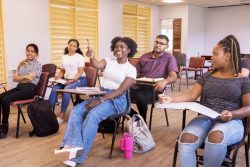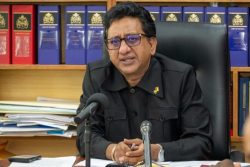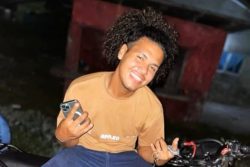Part 1
Tonight, I will then follow this by providing some evidence that the gender distribution in the Pure and Applied Sciences in the regional educational institutions is skewed, and by elaborating on why it is important that it be normalized in order for the Caribbean to maximize its potential for development in the 21st century.
In the third and final part of my talk I will make the case that mentoring in the primary, secondary and tertiary levels of education holds the key to: 1) correcting the skewed gender distribution, and 2) ultimately providing a workforce that not only reflects the demographics of the region, but also that is crucial for the region’s economic competitiveness and ability to move forward.
The Role of Science in Our Knowledge-based Economy Natural science research is and has always been an international endeavour. A relatively recent example of this is the Human Genome Project (HGP), which was publicly funded and initiated in 1990 in the U.S., with a goal of deciphering the sequence or chemical building blocks of the genome or genes that make up the complete chromosome set in a human cell. Soon after it was established in the U.S., the HGP grew into an international effort with programmes developing in countries such as Japan, Germany, and England. This led to the Human Genome Organization (HUGO), the initial goal of which was to coordinate the discovery efforts among participating countries.
By 2004 at the turn of the century, a working draft of the entire human sequence was established, almost two years ahead of the projected completion date. This major scientific endeavour opened the door to our understanding of the detailed genetic instructions that control the working of every cell, or, in other words, the blueprint of life. Consequently we have been provided with knowledge that allows the rational design of drugs to combat diseases, as well as to generate tools for more accurate and precise diagnosis of diseases. Like the proverbial “flap of the butterfly wing in Brazil that has set off a tornado in Texas”, our understanding of the control of cellular processes is rapidly changing the course of biomedical research and has resulted in biotechnological advances that have revolutionized agriculture.
In his book, “The Biotech Century: Harnessing the Gene and Remaking the World” Jeremy Rifkin, well-known public communicator of scientific and technological trends, explores the epic marriage between computer technology and genetic engineering and the historic transition into the Genetic Commerce. Rifkin sees the world economy as massively shifting away from the Industrial Age into an era in which giant life-science corporations are fashioning a Bio-industrial world.
Here in the Caribbean we are poised to embrace this Bio-Industrial revolution. For instance, the University of the West Indies, Mona campus, has established CARIGEN, Caribbean Genetics, a DNA diagnostic facility to provide comprehensive services for human, animal, plant, bacteria, and virus DNA testing, based on the new technologies in genetic engineering.
CARIGEN provides forensic DNA and paternity services to the judiciary, academia, the medical fraternity and to private citizens across the region in countries including Antigua, Barbados, Belize, Dominica, Cayman Islands, Grenada, S1. Lucia, and Trinidad & Tobago. It is a needed public facility in the region.
As scientific and technological advances gallop at an almost dizzying pace in this knowledge-based economy, it is important to note that the demand for the liberal arts skills in language, communication, team building, and creative thinking, has also significantly increased. High-tech CEOs have realized that liberal arts and science education nurture skills and talents increasingly valued by modern corporations. In extolling the value of a liberal arts education, Mark Barteau, Senior Vice Provost for Research and Strategic Initiatives at the University of Delaware in a recent address shared:
It’s easy to be dazzled by the potential of new science and technologies, but to nurture the richness of the human spirit, to understand communities from the local to the global, and to unleash the human imagination, it takes much more. It takes advances in the arts, humanities, and social sciences and in entrepreneurship, service and partnerships as well. In short, it takes a University!” And the University of the West Indies, the flagship institution in the English-speaking Caribbean where a number of other tertiary educational institutions have recently sprung up, is answering the clarion call for the necessity to institute suitable curricula that are relevant to our current needs. The mere increase in the number of tertiary institutions in the region represents an impressive gain in educational initiatives to meet the challenges of a knowledge-based economy. The University of the West Indies now markets programmes that produce career-ready graduates. The growth in the Natural Sciences Programme from being Pure Sciences (Botany, Chemistry, Mathematics, Physics and Zoology) that I studied as an undergraduate to Pure and Applied Sciences that include, Biochemistry, Computer Sciences, Geology, Meteorology, and Microbio-logy makes a strong case that the University of the West Indies is necessarily responsive to the call of our times.
Even more impressive has been the implementation of the 2007/2012 Strategic Plan for the UWI. In a recent issue of the Pelican,Professor E. Nigel Harris, Vice Chancellor, outline that the vision for the Plan springs from a collective desire that:
By 2012, The UWI will be an innovative, internationally competitive, contemporary university deeply rooted in the Caribbean and committed to creating the best possible future for all stakeholders. It will be the University of first choice for the region’s talented students and academics. It will provide a truly supportive environment that rewards excellence and it will be agile enough to thrive in a dynamic global environment’:
Along with sweeping changes in the Teaching and Learning activity, efforts to grow the Graduate programmes and to strengthen Research and Innovation are included in the four central pillars of the Plan. The two enablers identified for advancing the Research and Innovation pillar are a) financing and b) the strengthening of regional and international partnerships.
Substantial regional efforts have been made in partnerships instituted between the Mona campus of the UWI and the University of Guyana, the University of Suriname, and the University of Puerto Rico with respect to postgraduate training and research collaboration. Collaborative research at Mona is also being undertaken with Trinidad & Tobago (St. Augustine campus) and the University of Technology in Jamaica in the area of agriculture. At the international level, there are also encouraging efforts involving each of the UWI campuses. For example, the development of a public health degree programme in St. Augustine in collaboration with the University of Alabama, interaction between the UWI Mona School of Nursing and Duke and Emory Universities in the U.S., and a potential research partnership in Alternative Energy that involves all three campuses with the University of Flensburg in Germany. As UWI continues to broker more partnerships and thereby enlarge its Research and Development capabilities, it will also substantially increase its global competitiveness. Despite our size, global competitiveness in scientific research and in the technological field is a realistic goal because of major assets found in the region. One asset, previously noted in this forum, is the largely untapped bio-diversity in the Region. The wider Latin American Caribbean region has been noted to have more bio-diversity per 1000 km2 than in any other region in the world, with respect to the flora and fauna.
This along with the abundant potential energy resources, not the least of which are solar, hydro-power and plants for biofuels, puts the region at great advantage in capitalizing on the opportunities for development in the Bio-Industrial Age. Another relevant asset of the Region is the reputation of its educational system and its English-speaking people. As English is the international language of science, partnerships and collaborations that are developed open the door to international scrutiny and feedback. Both of these are required, or are essential, for winnowing from the chaff the good ideas that lead to innovations in technology.









